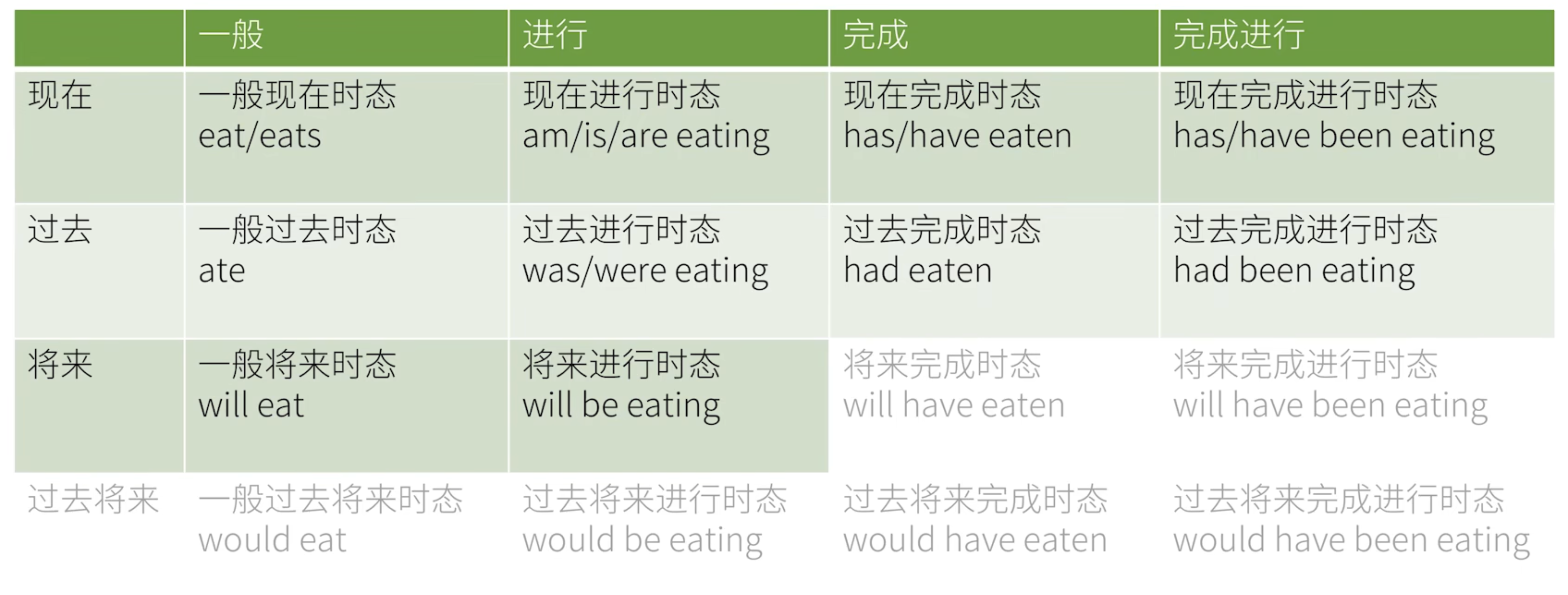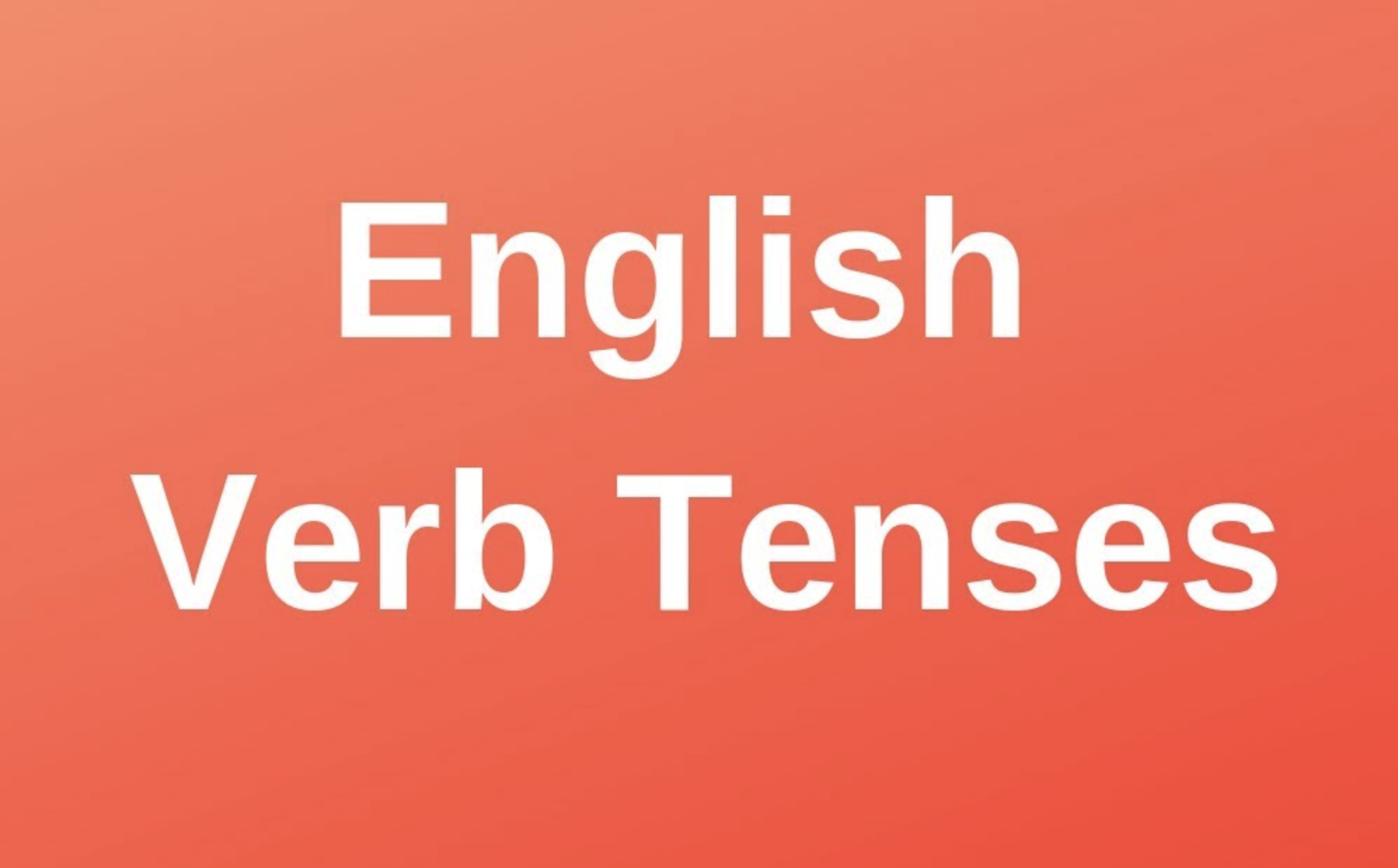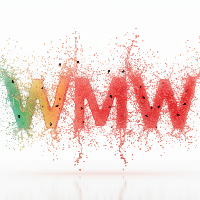正式学习之前,建议看下:https://www.youtube.com/watch?v=6SS7MR5cMrw
在学习时态时,我认为重点应放在其语义上,而非过分关注语法结构本身。
对中文母语者而言,过度拘泥于时态结构可能适得其反。
更有效的学习方法是通过大量例句来理解不同时态所传递及表达的意义。英语句子的时间和状态,连接的很紧密。
我相信,语言学习与深度学习类似,在海量语料的输入下,才能够取得显著进步。要多听、多看、多表达。

动词的变位
在开始时态的学习之前,我们首先来看下动词的变位。动词变位是指动词根据不同的语法功能而发生的形式变化。
英语动词有三个最基本的变位形式:
原形:动词的基本形式,如 eat, go, be
过去式:表示过去发生的动作,如 ate, went, was/were
过去分词:常用于完成时态和被动语态,如 eaten, gone, been
be的作用:
连系动词:连接主语和表语,表示状态。 例:She is happy.(她很开心。)
助动词,用于构成时态:主要用于构成进行时。 例:He is working.(他正在工作。)
被动态:用于构成被动语态。 例:The book was written by her.(这本书是她写的。)
have的作用:
实义动词:表示"拥有"的意思。 例:I have a car.(我有一辆车。)
助动词,用于构成时态:主要用于构成完成时。 例:They have finished their homework.(他们已经完成了作业。)
让我们通过分析两个句子来理解这些概念:
"have been eating"
have:助动词,用于构成现在完成时
been:be的过去分词,用于构成进行时
eating:eat的现在分词
这个短语表示现在完成进行时,描述一个从过去开始持续到现在的动作。 例句:I have been eating healthier food lately.(最近我一直在吃更健康的食物。)
"have been eaten"
have:助动词,用于构成现在完成时
been:be的过去分词,用于构成被动语态
eaten:eat的过去分词
这个短语表示现在完成时的被动语态,描述一个已经完成的被动行为。 例句:All the cookies have been eaten.(所有的饼干都被吃掉了。)
这两个例子,我们可以看到be和have如何作为助动词与其他动词形式配合,构成不同的时态和语态。"been"在第一个例子中帮助构成进行时,在第二个例子中帮助构成被动语态,展示了be动词的多功能性。
动词变位的材料整理下载:
一般现在时(Simple Present Tense)
动词原形
动词原形+s
用途:表示经常性、重复性的动作,或普遍真理。
I go to work by bus every day.
The sun rises in the east.
She plays tennis on weekends.
Water boils at 100 degrees Celsius.
They live in New York.
Cats sleep for up to 16 hours a day.
He usually drinks coffee in the morning.
The Earth revolves around the sun.
My sister works as a nurse at the local hospital.
In winter, it often snows in this region.
现在进行时(Present Progressive Tense)
助动词be的变位+动词的现在分词
I am
you/we/they are
she/he/it is
用途:表示正在进行的动作,或最近的将来安排。
I am writing an email right now.
They are playing football in the park.
She is studying for her exam.
We are having dinner with friends tonight.
The company is expanding its operations.
Look! It's raining outside.
I'm reading an interesting book about history.
They are redecorating their house this week.
He's not working today because he's feeling unwell.
We're planning our vacation for next month.
最近的将来安排:
"We are having dinner with friends tonight." 表示这个晚餐已经安排好了,是一个确定的计划。
"We will have dinner with friends tonight." 也没有错,但听起来更像是一个未来的可能性或决定,而不是已经安排好的事情。
使用 "we are having" 而不是 "we will have" 是因为 "we are having" 强调的是一个已经安排好的、即将发生的事件,具有更强的确定性和即将实现的感觉。这种用法在英语中非常常见,尤其是在谈论已经计划好的未来活动时。
现在完成时(Present Perfect Tense)
助动词have的变位+动词的过去分词
I/you/we/they have
she/he/it has
用途:表示过去发生并持续到现在的动作,或过去发生对现在有影响的动作。
I have lived in this city for ten years.
She has just finished her homework.
They have never been to Paris.
We have already seen that movie twice.
How long have you known each other?
The team has won five matches in a row.
I've lost my keys. Have you seen them?
She has learned three languages so far.
Scientists have made significant progress in cancer research.
We haven't had a vacation since last summer.
这个时态,给我的感觉,就是既存事实。在中文里面,就是完成了、做过了、去过了、看过了、学会了、吃过了、喝过了、取得了、造成了、拿到了、丢失了、获得了、赢得了类似这些意思。
做完这件事情,对于现在是有影响的。而不是单纯的描述过去做了一件事,我做完了一件事,然后呢?
就像我家小孩说,我做完了作业,然后呢?可能就是想要打会儿游戏了。要用这个角度,去带入,自己的日常的表述。
“Daddy,I have finished my homework."言下之意就是,接下去可以打游戏了。
两个小孩对话:"I have been to Disneyland." "I have been there too."
言下之意,就是两个小朋友在吹牛逼较劲。
现在完成进行时(Present Prefect Progressive Tense)
助动词have的变位+been+动词的现在分词
用途:强调一个开始于过去并持续到现在的动作的持续性。
I have been waiting for an hour.
She has been studying English since she was a child.
They have been arguing all morning.
How long have you been working on this project?
It has been raining non-stop for three days.
We have been living in this neighborhood for over a decade.
He has been playing the piano since he was five years old.
The scientists have been researching this phenomenon for years.
I've been feeling tired lately. Maybe I should see a doctor.
They have been trying to solve this problem all week.
这个时态,按照我的理解,就是描述一件从过去开始到现在一直持续的某种状态。
不仅仅是吃过、看过、玩过,经历过,而且一直延续到现在的那种感觉。
比如说,老子有钱,都富了三代了。"I'm rich. My family has been wealthy for three generations."这种表述,就是现在完成进行时。和上边的现在完成时相比,上边的是点动词,这边是连续的。
从中文的语境,大家可以感受一下,你要表达的那种意思。其实中文也挺绕的,但我们作为中文母语者,表达时,不会去思考时态。我们更多的是,想要把那种感觉给说出来。
我觉得,英文时态的学习,更多的也应该是要去感觉,不要拘泥于时态本身,你管他什么时态,你能正确的表达出你想要的那种意思,找到那种感觉,才是一切的根本。
现在完成进行时态,它能表达的含义是很美妙的。
比如,两个人异地恋,男的给女的发一条信息:
从我踏上火车的那一刻起,我无法控制自己的思绪,一直在想着你。Since the moment I stepped onto the train, I have been unable to control my thoughts and have been thinking about you constantly.
其隐含的就是现在完成进行时“have been thinking about you”,表达的是那股子骚气,时态的复杂,能够让文字和语言,变得更加的有韵味。
一般过去时(Simple Past Tense)
+动词的过去式
1、动作发生了
2、无法表述过去的习惯,需要借助used to
用途:表示过去某一时刻发生的动作或状态。
I watched a movie last night.
She visited her grandparents last summer.
They bought a new car two weeks ago.
When did you arrive in London?
The company launched its new product in January.
He graduated from university in 2015.
We had a great time at the party yesterday.
I met my best friend in high school.
The ancient Egyptians built the pyramids thousands of years ago.
She learned to swim when she was six years old.
这个时态可以用来讲述之前发生的事情,陈述事实,回忆往事等。其实很容易错,我自己感觉,表达时特别容易脱口而出一般现在时。
这个是由于,中文没有动词的过去式。所以,虽然时态简单,但是实际使用出错很多,一般过去时使用的又非常多。
需要不断的练习,逼迫自己,
在英语语境下边,能够下意识的进行过去式的转换。
但是难度真的很高,年纪越大,转换越难啊。
过去进行时(Post Progressive Tense)
助动词be的变位+动词的现在分词
I/she/he/it was
you/we/they were
用途:表示过去某一时刻正在进行的动作,常与一般过去时连用。
I was reading a book when she called.
They were having dinner when the earthquake happened.
What were you doing at 8 pm yesterday?
While he was walking home, it started to rain.
The children were playing in the garden all afternoon.
She was working on her thesis when the power went out.
We were watching TV when we heard a loud noise outside.
As I was driving to work, I saw an accident on the highway.
They were discussing their plans when the boss walked in.
While the chef was preparing dinner, the fire alarm went off.
看起来简单,但是难点在于下意识的进行助动词be的过去式的转换,因为中文没有过去式的变化。
和一般过去时一样,要做到下意识,难啊。
过去完成时态(Past Perfect Tense)
助动词had + 动词的过去分词
用途:表示过去某一时刻之前已经完成的动作。
By the time I arrived, the meeting had already started.
She had never seen snow before she moved to Canada.
They had finished their work before the deadline.
I realized I had forgotten my keys when I reached the door.
After he had graduated, he started his own business.
The plane had already taken off when we reached the airport.
She felt sick because she had eaten too much at the party.
The criminals had escaped before the police arrived at the scene.
He was upset because someone had stolen his bicycle.
We couldn't get into the house because we had lost our keys.
这个时态,它就是为了表达,过去的某件事情,对过去产生了影响。
比如:你描述昨晚的聚餐,你在吃饭的时候,已经喝了很多酒,所以,当你到了KTV的时候,你实在是喝不下了。
一定是这种句子里面,才有可能用到这个时态。“已经喝了很多酒”就是过去完成时。
再举个例子:你昨天下午来找我开会的时候,我已经出发去机场了。
过去完成进行时态(Past Perfect Progressive tense)
助动词had+been+动词的现在分词
用途:强调在过去某一时刻之前一直在进行的动作。
I had been studying for three hours when my friend called.
They had been living in Japan for ten years before they moved back.
How long had you been waiting before the bus arrived?
She had been working on the project for months before she finally finished it.
We had been discussing the issue for hours before we reached a decision.
The ground was wet because it had been raining all night.
By the time he retired, he had been teaching for 35 years.
They were exhausted because they had been traveling all day.
The couple had been arguing for weeks before they decided to see a counselor.
I had been trying to solve the puzzle for hours when I finally found the solution.
举个例子:我昨天下班进门的时候,你打游戏已经打了一段时间了。
When I got home from work yesterday, you'd been playing video games for a while.
一般将来时(Simple Future Tense)
will + 动词原形
用途:表示将来某一时刻会发生的动作或状态。
I will call you tomorrow.
The meeting will start at 2 pm.
She will graduate next year.
They will move to a new house next month.
What will you do after you finish school?
The weather forecast says it will rain this weekend.
I'm sure you'll enjoy the movie.
We will announce the results next week.
The new subway line will open in 2025.
Don't worry, everything will be fine.
除了will这个表达之外,英语中表达将来时的方式其实很多,或者说,将来时可能更本就不存在:
一般现在时:表达按时间表将要发生的事情。例: The meeting starts at 2 pm. (会议下午两点开始。)
be going to + 动词原形:表达计划、打算或有迹象表明即将发生的事情。例: I am going to study abroad next year. (我明年打算出国留学。)
to be + 动词原形:强调客观安排,语气较正式。例: The new policy is to be implemented next month. (新政策将于下月实施。)
about to + 动词原形:表示即将发生的事情,强调“马上,就要”。例: The plane is about to take off. (飞机马上就要起飞了。)
will + 动词原形:表示将来会发生的事情,可以指预测、承诺、意愿等。例: We will have dinner with friends tonight. (我们今晚将会和朋友们共进晚餐。)
现在进行时 (be + 动词ing):表示已经安排好的将来计划,通常指近期的计划。例: We are having dinner with friends tonight. (我们今晚和朋友们有约一起吃晚餐。)
将来进行时(Future Progressive Tense)
will + be + 动词的现在分词
用途:表示将来某一时刻正在进行的动作。
This time next week, I will be lying on a beach in Hawaii.
They will be working on the project all day tomorrow.
At 3 pm, she will be attending a conference.
Will you be staying with your parents when you visit your hometown?
The team will be training hard for the upcoming competition.
This time tomorrow, we'll be flying over the Atlantic.
She'll be presenting her research at the symposium next month.
I'll be thinking of you while I'm away on my business trip.
By this time next year, they'll be living in their new house.
Don't call after 10 pm; I'll be sleeping by then.
将来完成时(Future Perfect Tense)
will have + 动词的过去分词
用途:表示在将来某一时刻之前已经完成的动作。
By this time next year, I will have graduated from university.
They will have finished the construction by the end of next month.
She will have completed her training before she starts her new job.
Will you have submitted your application by the deadline?
The company will have launched five new products by the end of this year.
By 2030, scientists predict we will have discovered new planets suitable for human habitation.
I will have saved enough money for a down payment on a house by next summer.
They will have been married for 25 years by their next anniversary.
By the time you wake up tomorrow, I will have left for my business trip.
The author will have written ten books by the time she retires.
将来完成进行时(Future Perfect Progressive Tense)
will have been + 动词的现在分词
用途:强调在将来某一时刻之前一直在进行的动作。
By next month, I will have been working here for ten years.
They will have been living in their new house for a year by Christmas.
How long will you have been studying English when you take the exam?
She will have been teaching for 25 years when she retires.
The scientists will have been researching this problem for a decade by the time they find a solution.
By the time the movie ends, we will have been sitting in this theater for over three hours.
Next week, they will have been dating for exactly two years.
At the end of this semester, I will have been attending this university for four years.
By the end of this decade, scientists will have been researching quantum computing for over 50 years.
When the project is completed, the team will have been working on it non-stop for 18 months.
过去将来时(Past Future Tense 4in1)
过去将来时,常出现在从句中
will 转变为 would
过去将来时 (Future in the Past)
用途:从过去的角度谈论将来的事。
I knew I would see her again someday.
They said they would call us when they arrived.
She was sure she would pass the exam.
We thought the party would be fun, but it was boring.
He promised he would help me move house.
The weather forecast predicted it would rain all weekend.
I had a feeling the interview would go well, and it did.
They were confident their team would win the championship.
She told me she would finish the project by Friday.
We hoped the situation would improve, but it only got worse.
过去将来进行时 (Future Continuous in the Past)
用途:从过去的角度谈论将来某一时刻正在进行的动作。
I thought I would be working late that night, but I finished early.
She said she would be waiting for us at the station.
We knew they would be studying all weekend for their exams.
He told me he would be attending a conference in New York next week.
I was worried I would be bothering them if I called so late.
They assumed I would be joining them for dinner, but I had other plans.
The manager announced that the team would be working overtime for the next month.
She mentioned she would be traveling to Europe during the summer.
We expected we would be moving to a new office by the end of the year.
He said he would be giving a presentation at the meeting tomorrow.
过去将来完成时 (Future Perfect in the Past)
用途:从过去的角度谈论在将来某一时刻之前已经完成的动作。
I had hoped I would have finished the project by now.
They were certain they would have sold the house before winter.
She thought she would have learned to drive by the time she graduated.
We expected we would have received a response by yesterday.
He was sure he would have saved enough money for the trip by summer.
The company announced that it would have launched the new product line by the end of the quarter.
She believed she would have mastered the language by the time she moved to the country.
We were confident we would have completed the marathon training by race day.
They anticipated they would have resolved all the technical issues before the system went live.
I assumed I would have heard back about the job application by last week.
过去将来完成进行时 (Future Perfect Continuous in the Past)
用途:从过去的角度强调在将来某一时刻之前一直在进行的动作。
I had assumed I would have been working here for twenty years by now.
They thought they would have been living abroad for at least a year by this time.
She expected she would have been studying medicine for six years by the time she qualified.
We believed we would have been using the new system for months by the time the audit came.
He had hoped he would have been running his own business for several years by his 30th birthday.
The athletes knew they would have been training intensively for years by the time the Olympics arrived.
She imagined she would have been teaching at the university for a decade by the time she became a professor.
We anticipated we would have been implementing the new strategy for at least six months by the end of the fiscal year.
They figured they would have been saving money for their dream house for five years by their wedding anniversary.
He calculated that by retirement, he would have been contributing to his pension fund for over 40 years.
现在完成时VS过去进行时VS一般过去时
这三者其实是容易混淆的,但是还是要从表达的含义出发。其实有了上下文之后,应该是比较明确的。
I have gone to Shanghai 强调的是结果和当前状态(人现在在上海)。
I have been to Shanghai 强调的是过去的经历和经验(人现在不在上海)。
I went to Shanghai 强调的是过去的具体事件(强调时间点和动作本身)。
更多的案例,方便进行集中强化的理解:
关于职业生涯
I have gone into consulting. (我已经进入咨询行业,现在正在从事这份工作。)
I have been in consulting. (我曾经从事过咨询工作,但现在可能已经换行业了。)
I went into consulting right after college, but soon realized it wasn't for me. (我大学毕业后就进入了咨询行业,但很快意识到这并不适合我。)
关于学术研究
I have gone deep into quantum physics research. (我已深入量子物理研究,目前仍在这个领域。)
I have been into quantum physics research. (我曾经研究过量子物理,但可能现在已经转向其他领域。)
I went into quantum physics research during my postdoc, which laid the foundation for my current work in cryptography. (我在博士后期间研究了量子物理,这为我目前在密码学领域的工作奠定了基础。)
关于人生转折
I have gone through a major life change. (我经历了一次重大的人生变化,现在正处于这个变化的过程中或结果中。)
I have been through several major life changes. (我经历过几次重大的人生变化,强调多次经历。)
I went through a major life change last year when I decided to start my own business. (去年我决定创业时经历了一次重大的人生转变。)
关于文化适应
I have gone native in Japan. (我已经完全适应了日本的生活方式,现在仍在日本。)
I have been immersed in various cultures. (我曾沉浸在不同的文化中,强调多样化的文化经历。)
When I went to live in Japan in my twenties, I experienced severe culture shock. (我二十多岁时去日本生活,经历了严重的文化冲击。)
关于技能发展
I have gone from novice to expert in machine learning. (我已从机器学习的新手成长为专家,现在仍在这个领域。)
I have been exposed to various programming paradigms. (我接触过各种编程范式,强调广泛的经验。)
I went from knowing nothing about coding to building my first app in just six months. (我在短短六个月内从对编程一无所知到构建了我的第一个应用。)
关于心理健康
I have gone through therapy to deal with anxiety. (我正在接受治疗来应对焦虑,治疗可能仍在进行。)
I have been to therapy for various issues over the years. (多年来,我因为不同的问题接受过治疗,强调多次经历。)
I went to therapy after a particularly stressful period at work, which helped me develop better coping mechanisms. (在工作中经历了特别紧张的一段时间后,我去接受了心理治疗,这帮助我形成了更好的应对机制。)
关于创业经历
I have gone all in on my startup. (我已全身心投入到我的创业项目中,现在仍在进行。)
I have been involved in several startups. (我参与过几个创业项目,强调多次经历。)
I went through the grueling process of launching a startup in 2015, which ultimately failed but taught me valuable lessons. (2015年,我经历了创业的艰辛过程,虽然最终失败了,但学到了宝贵的经验。)
关于艺术创作
I have gone into abstract expressionism in my recent works. (我最近的作品已经转向抽象表现主义,现在仍在这个风格中创作。)
I have been exploring various art movements in my career. (在我的职业生涯中,我探索过各种艺术流派,强调多样化的经历。)
When I went to art school, I focused primarily on realism before branching out. (当我上艺术学校时,我主要专注于现实主义,之后才开始尝试其他流派。)
关于环境保护
I have gone completely zero-waste in my lifestyle. (我的生活方式已经完全实现了零废弃,现在仍在坚持。)
I have been involved in various environmental initiatives over the years. (多年来,我参与过各种环保倡议,强调长期和多样的参与。)
I went vegetarian for a year as part of an environmental awareness campaign, which changed my perspective on food consumption. (作为环保意识运动的一部分,我坚持了一年的素食,这改变了我对食物消费的看法。)
关于语言学习
I have gone fluent in Mandarin after years of study and immersion. (经过多年的学习和沉浸,我已经能流利地说普通话了,现在仍在使用和提高。)
I have been learning various languages on and off throughout my life. (我一生中断断续续学习过多种语言,强调多次尝试的经历。)
When I went to China for a semester abroad, I realized how much my language skills needed improvement. (当我去中国进行海外学期交换时,我意识到自己的语言技能还需要多少改进。)

